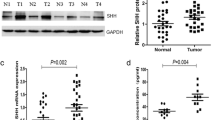Abstract
Hedgehog signaling pathway plays an important role in normal mammalian gastrointestinal development and is implicated in the oncogenesis of various tumors. However, its correlation with progression and prognosis of colon cancer has not been well documented. This study was designed to investigate expression patterns of related proteins in hedgehog signaling pathway in colon cancer to elucidate its prognostic value in this tumor. Using human colon cancer and their corresponding non-diseased colon from 228 patients’ biopsies, the expression of sonic hedgehog, its receptor Patched, and downstream transcription factor Gli1 was investigated by immunohistochemical staining to assess their association with the clinicopathological characteristics of colon cancer. Disease-free survival and overall survival were examined by Kaplan–Meier estimates and the log-rank test. Prognostic factors were determined by multivariate Cox analysis. One hundred and thirty-eight patients (59.6%) had sonic hedgehog-positive tumors and that the disease-free survival (43.5 vs. 73.3%, P < 0.001), and overall survival rates (50.7 vs. 88.9%, P < 0.001) of patients with sonic hedgehog-positive tumors were much lower than those of patients with sonic hedgehog-negative tumors. In addition, 163 patients (71.5%) had Patched-positive tumors, and the disease-free survival (41.7 vs. 76.9%, P < 0.001) and overall survival rates (55.2 vs. 80.0%, P = 0.002) of patients with Patched-positive tumors were also lower than those of patients with Patched-negative tumors. Moreover, positive Gli1 expression had a bad effect on the disease-free survival (41.9 vs. 73.2%, P < 0.001) and overall survival rate of patients with colon cancer (50.0 vs. 89.3%, P < 0.001). In a multivariate analysis, sonic hedgehog, Patched, and Gli1 status were indicators for poor disease-free survival and overall survival. These results have shown that the increasing expression of sonic hedgehog, Patched, and Gli1 are indicators for a poor prognosis in patients with colon cancer. This is the first report describing about the relationship between hedgehog signaling pathway and the prognosis of colon cancer.

Similar content being viewed by others

References
Bai HL, Chen B, Zhou Y, Wu XT. Five-year long-term outcomes of laparoscopic surgery for colon cancer. World J Gastroenterol. 2010;16:4992–7.
Luglio G, Nelson H. Laparoscopy for colon cancer: state of the art. Surg Oncol Clin N Am. 2010;19:777–91.
Peng RQ, Wu XJ, Ding Y, Li CY, Yu XJ, Zhang X, et al. Co-expression of nuclear, cytoplasmic HMGB1 is inversely associated with infiltration of CD45RO+T cells, prognosis in patients with stage IIIB colon cancer. BMC Cancer. 2010;10:496.
Pasca di Magliano M, Hebrok M. Hedgehog signalling in cancer formation and maintenance. Nat Rev Cancer. 2003;3:903–11.
Kameda C, Tanaka H, Yamasaki A. The Hedgehog pathway is a possible therapeutic target for patients with estrogen receptor-negative breast cancer. Anticancer Res. 2009;29:871–9.
Lauth M, Toftgrd R. The Hedgehog pathway as a drug target in cancer therapy. urr Opin Investig Drugs. 2007;8:457–61.
Laurendeau I, Ferrer M, Garrido D. Gene expression profiling of the Hedgehog signaling pathway in human meningiomas. Mol Med. 2010, In press.
Walter K, Omura N, Hong SM. Overexpression of smoothened activates the sonic hedgehog signaling pathway in pancreatic cancer-associated fibroblasts. Clin Cancer Res. 2010;16:1781–9.
Yanai K, Nagai S, Wada J. Hedgehog signaling pathway is a possible therapeutic target for gastric cancer. J Surg Oncol. 2007;95:55–62.
Thayer SP, di Magliano MP, Heiser PW. Hedgehog is an early and late mediator of pancreatic cancer tumorigenesis. Nature. 2003;425:851–6.
Berman DM, Karhadkar SS, Maitra A. Widespread requirement for Hedgehog ligand stimulation in growth of digestive tract tumours. Nature. 2003;425:846–51.
Ma X, Chen K, Huang S. Frequent activation of the hedgehog pathway in advanced gastric adenocarcinomas. Carcinogenesis. 2005;26:1698–705.
Yoshikawa K, Shimada M, Miyamoto H, Higashijima J, Miyatani T, Nishioka M, et al. Sonic hedgehog relates to colorectal carcinogenesis. J Gastroenterol. 2009;44:1113–7.
You S, Zhou J, Chen S, Zhou P, Lv J, Han X, et al. PTCH1, a receptor of Hedgehog signaling pathway, is correlated with metastatic potential of colorectal cancer. Ups J Med Sci. 2010;115:169–75.
Shi T, Mazumdar T, Devecchio J, Duan ZH, Agyeman A, Aziz M, et al. cDNA microarray gene expression profiling of hedgehog signaling pathway inhibition in human colon cancer cells. PLoS One. 2010; 5.
Oue T, Yoneda A, Uehara S, Yamanaka H, Fukuzawa M. Increased expression of the hedgehog signaling pathway in pediatric solid malignancies. J Pediatr Surg. 2010;45:387–92.
Morishita A, Gong J, Nomura T, Yoshida H, Izuishi K, Suzuki Y, et al. The use of protein array to identify targetable receptor tyrosine kinases for treatment of human colon cancer. Int J Oncol. 2010;37:829–35.
Feason ER, Vogelstein BA. A genetic model of colorectal tumorigenesis. Cell. 1990;61:759–61.
Nüsslein-Volhard C, Wieschaus E. Mutations affecting segment number and polarity in Drosophila. Nature. 1980;287:795–801.
Ingham PW, McMahon AP. Hedgehog signaling in animal development: paradigms and principles. Genes Dev. 2001;15:3059–87.
Ramalho-Santos M, Melton DA, McMahon AP. Hedgehog signals regulate multiple aspects of gastrointestinal development. Development. 2000;127:2763–72.
Morton JP, Mongeau ME, Klimstra DS. Sonic hedgehog acts at multiple stages during pancreatic tumorigenesis. Proc Natl Acad Sci USA. 2007;104:5103–8.
Berman DM, Karhadkar SS, Maitra A. Widespread requirement for Hedgehog ligand stimulation in growth of digestive tract tumors. Nature. 2003;425:846–51.
Coultas L, Nieuwenhuis E, Anderson GA. Hedgehog regulates distinct vascular patterning events through VEGF dependent and independent mechanisms. Blood. 2010 In press.
Oniscu A, James RM, Morris RG, Bader S, Malcomson RD, Harrison DJ. Expression of Sonic hedgehog pathway genes is altered in colonic neoplasia. J Pathol. 2004;203:909–17.
Chatel G, Ganeff C, Boussif N, Delacroix L, Briquet A, Nolens G, et al. Hedgehog signaling pathway is inactive in colorectal cancer cell lines. Int J Cancer. 2007;121:2622–7.
Author information
Authors and Affiliations
Corresponding author
Rights and permissions
About this article
Cite this article
Xu, M., Li, X., Liu, T. et al. Prognostic value of hedgehog signaling pathway in patients with colon cancer. Med Oncol 29, 1010–1016 (2012). https://doi.org/10.1007/s12032-011-9899-7
Received:
Accepted:
Published:
Issue Date:
DOI: https://doi.org/10.1007/s12032-011-9899-7



